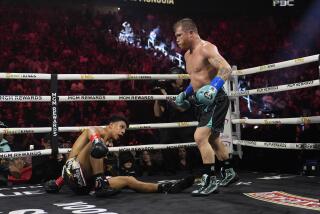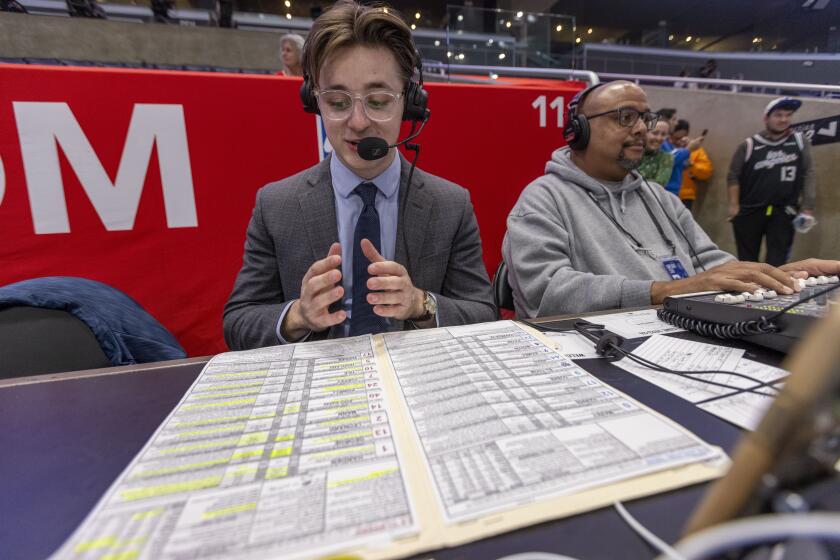Making Baseball’s Washington Pitches
Baseball is in trouble. Accusations of steroid use are in the air. Players are threatening to strike. Congress is eyeing the coveted antitrust exemption. Small-market teams are raging about big-market TV money. And following the action as closely as a manager in the bottom of the ninth with the bases loaded and the score tied is the woman who is Major League Baseball’s lobbyist, Lucy Calautti.
“I hired her because she was a huge fan and she knew Washington and she was so conscientious,” said baseball Commissioner Bud Selig, who talks to Calautti two or three times a day. “It’s turned out even better than I could have imagined. She’s very loyal, and she has great judgment.”
Calautti, 55, rarely gives interviews, shuns the limelight and prefers to see Selig’s name in print to her own. “A very low profile,” is how USA Today’s baseball writer, Mel Antonen, describes her. “Her reputation? It’s just not there.”
But Calautti, say her fans, is doing what she does best and what baseball needs most--working quietly and influentially behind the scenes. For baseball’s Washington lobbyist, hitting a home run often means keeping Congress out of the ballpark. And Calautti, who has 20 years of experience on Capitol Hill, knows how to do that.
“Baseball doesn’t want someone who is highly visible,” said Sen. Byron Dorgan (D-N.D.), who hired Calautti nearly 30 years ago when he was a young tax commissioner in Bismarck, N.D. Dorgan said Calautti kept autographed baseballs on her desk when she worked for him in the Senate. He calls her “not only America’s No. 1 baseball fan but an extraordinary talent.”
Her job is not so much to front the issues that separate sports from politics as to take the front-line flak for the controversies that spark from their uneasy alliance. When Selig announced plans last fall to eliminate two teams, she advised him on how to weather the storm of congressional hearings and threats to eliminate baseball’s antitrust exemption. And when Selig ended the All-Star game in a tie after 11 innings, it was Calautti who had to put the best spin on it around town.
“I was watering the garden last night in front of my Capitol Hill home and I was besieged with comments,” she said last month. “Everybody from a Library of Congress staffer, to members of Congress, to reporters who are neighbors, to one young kid who’s a big Baltimore Orioles’ fan had something to say.”
She explained to all that the two teams had simply run out of pitchers, perhaps in a misguided attempt by the leagues to play everybody. Selig, she told everyone, was very unhappy, and vowed that it would never happen again.
“My small job in baseball is to explain this in Washington, a town where anything that happens in baseball can have a repercussion among public policymakers with very strong opinions,” she said.
With the national pastime comes national scrutiny. One senator even teased her that perhaps he would call hearings into the dearth of pitchers at All-Star games.
Calautti comes to her baseball credentials as most do, from childhood. The daughter of an Italian-American father and an orthodox Jewish mother (“we only cooked Italian, except on Passover,” she said), she was the second of three children, and the only girl.
But she became the baseball child, as a teenager traveling with her father by train from Queens to watch the New York Mets play at the old Polo Grounds.
Pasquale Oempedicles Calautti, a chandelier-maker by day and jazz musician on weekends, taught Lucy about the infield fly rule and showed her how to keep score. He also talked to her about the birds and the bees (“he told me not to worry about it, because it was not something I was going to be doing until I was married,” she recalled with a smile) and, mostly, about life.
Perhaps the greatest lesson she learned from him--the one that makes her indispensable to politicians and baseball commissioners alike--concerns one of the Mets’ earliest shortstops.
Elio Chacon batted .236 in 1962, a three-year major leaguer who had more hustle than skill.
“He wasn’t a great talent, but he tried so hard and he never gave up and my father really wanted me to learn that,” Calautti recalled. “My father was right, Chacon never really went anywhere, but I remember his name because of that lesson. Never give up. It doesn’t matter if you’re not best at what you do, you just have to work hard.”
Her father died one week before she took the baseball job, too ill to appreciate the magic it represented for both of them. She muses that “if he had been younger, and well, I can just hear him saying, ‘How about my little girl.’ ”
Calautti is like the hare, aiming to finish the task at hand no matter the speed. To this day, she credits her career success to an uncommon conscientiousness. Asked why her future husband, Kent Conrad, hired her to run his maiden campaign for the U.S. Senate, she replied, “He knew I’d work my heart out.”
Friends call her goal-oriented.
“If she’s supposed to achieve X, Y or Z, that comes first,” said Sara Garland, who worked with Calautti on the Hill and is now a lobbyist. “She’s very successful in putting in a job that needs to get done in front of her own ego.” If she learned tenacity from her father, she inherited a sense of adventure from her mother. Eager to leave home, scheming to figure out how to pay for college, she joined the Navy after high school. The nation was at war in Vietnam, and the Navy made her a photographer, though a battery of tests showed her skills lay elsewhere. Soon, she found herself hanging out of airplanes above the Atlantic, taking pictures of ships at sea, thrilling to the adventure.
“I loved it,” she said.
She returned to New York after her tour of duty but soon rebelled against the crowds and other penalties of city life. Her best friend in the Navy, Sandy Boyum, visited during the city’s six-month garbage strike and boasted of her life in North Dakota. The final straw came one day in front of the No. 7 train at rush hour. The crowds pushed her toward the train. Calautti ran the other way.
She took a train instead to Denver, then boarded a bus to Fargo. She arrived in a blizzard and stayed for decades. She got her bachelor’s and master’s degrees in English from North Dakota State. Now she considers herself a New Yorker who became a North Dakotan. Sometimes she sounds like Marge Gunderson in the movie “Fargo,” sprinkling her sentences with an occasional “you betcha.”
She married, had a son, divorced. Working for Dorgan in the tax office and later in the U.S. House of Representatives, she met a colleague who she thought was a brilliant strategist. He asked her to run his longshot campaign for U.S. senator from North Dakota.
In November 1986, Conrad was elected to the U.S. Senate. The following Valentine’s Day, he and Lucy Calautti were married. Among the common denominators: They both loved baseball.
He brings his glove to Orioles’ games at Camden Yards. Every morning, she reads the agate on team standings and player statistics, and these days she also checks the attendance records. Barry Piatt, Dorgan’s communications director, once went to a game with the couple.
“It was particularly fun to sit next to Lucy,” he said. “It’s like sitting next to your own radio broadcaster. She knows the stats on everybody--who’s struggling in the bullpen, and at the plate.”
Two years ago, Calautti approached Selig at the All-Star game and told him that she wanted to speak with him about what she could do for baseball.
“My heart was pounding, like a kid,” she said.
Selig had just closed baseball’s Washington office. Now he turned to Calautti, and she left her Capitol Hill post in late 2000.
In May, Sports Illustrated published an interview with Ken Caminiti. The former San Diego Padre said he had used steroids, and half the league did too. Sen. John McCain (R-Ariz.) pushed for hearings. Selig demurred, telling Calautti he would rather Capitol Hill understand baseball’s position than hold hearings on it. Calautti says she told him, “The Senate’s the Senate.”
In fact, Calautti counts the hearings as a success because they allowed Selig to tell his side of the story--that Major League Baseball has been pushing for mandatory testing for years. Since then, it’s been baseball union boss Don Fehr, rather than Selig, who has been on the defensive.
“Because we’re the national pastime, we get all the attention,” said Calautti, a trace of sarcasm creeping into her voice. “Did you know the Charlotte Hornets are leaving Charlotte? Anybody holding hearings on that?”
Garland, who served as chief of staff to Conrad, walks with Calautti from their homes on Capitol Hill to the Smithsonian Mall whenever they can. She reports that Calautti is “bouncier” these days. “Are you kidding? She’s been dreaming about this job all her life.”
More to Read
Get our high school sports newsletter
Prep Rally is devoted to the SoCal high school sports experience, bringing you scores, stories and a behind-the-scenes look at what makes prep sports so popular.
You may occasionally receive promotional content from the Los Angeles Times.






